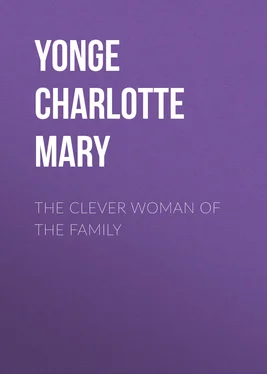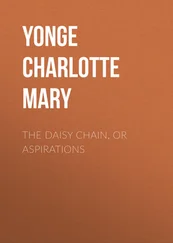Charlotte Yonge - The Clever Woman of the Family
Здесь есть возможность читать онлайн «Charlotte Yonge - The Clever Woman of the Family» — ознакомительный отрывок электронной книги совершенно бесплатно, а после прочтения отрывка купить полную версию. В некоторых случаях можно слушать аудио, скачать через торрент в формате fb2 и присутствует краткое содержание. Жанр: foreign_prose, literature_19, Европейская старинная литература, foreign_antique, на английском языке. Описание произведения, (предисловие) а так же отзывы посетителей доступны на портале библиотеки ЛибКат.
- Название:The Clever Woman of the Family
- Автор:
- Жанр:
- Год:неизвестен
- ISBN:нет данных
- Рейтинг книги:4 / 5. Голосов: 1
-
Избранное:Добавить в избранное
- Отзывы:
-
Ваша оценка:
- 80
- 1
- 2
- 3
- 4
- 5
The Clever Woman of the Family: краткое содержание, описание и аннотация
Предлагаем к чтению аннотацию, описание, краткое содержание или предисловие (зависит от того, что написал сам автор книги «The Clever Woman of the Family»). Если вы не нашли необходимую информацию о книге — напишите в комментариях, мы постараемся отыскать её.
The Clever Woman of the Family — читать онлайн ознакомительный отрывок
Ниже представлен текст книги, разбитый по страницам. Система сохранения места последней прочитанной страницы, позволяет с удобством читать онлайн бесплатно книгу «The Clever Woman of the Family», без необходимости каждый раз заново искать на чём Вы остановились. Поставьте закладку, и сможете в любой момент перейти на страницу, на которой закончили чтение.
Интервал:
Закладка:
“I cannot be sure,” said the aunt, “my sister tried to find a figure of it at Villars’, but he had no book that gave the caterpillars. Do you care for those creatures?”
“I like to watch them,” said Grace, “but I know nothing about them scientifically; Rachel does that.”
“Then can you help us to the history of our sphynx?” asked Miss Williams, with her pleasant look.
“I will see if I have his portrait,” said Rachel, “but I doubt it. I prefer general principles to details.”
“Don’t you find working out details the best way of entering into general principles?”
It was new to Rachel to find the mention of a general principle received neither with a stare nor a laugh; and she gathered herself up to answer, “Naming and collecting is not science.”
“And masonry is not architecture, but you can’t have architecture without it.”
“One can have broad ideas without all the petty work of flower botanists and butterfly naturalists.”
“Don’t you think the broad ideas would be rather of the hearsay order, at least to most people, unless their application were worked out in the trifle that came first to hand?”
“Experimental philosophy,” said Rachel, in rather a considering tone, as if the notion, when presented to her in plain English, required translation into the language of her thoughts.
“If you like to call it so,” said Miss Williams, with a look of arch fun. “For instance, the great art of mud pie taught us the porous nature of clay, the expansive power of steam, etc. etc.”
“You had some one to improve it to you?”
“Oh dear no. Only afterwards, when we read of such things we remembered how our clay manufactures always burst in the baking unless they were well dried first.”
“Then you had the rare power of elucidating a principle?”
“No, not I. My brother had; but I could only perceive the confirmation.”
“This reminds me of an interesting article on the Edgeworth system of education in the ‘Traveller’s Review.’ I will send it down to you.”
“Thank you, but I have it here.”
“Indeed; and do you not think it excellent, and quite agree with it?”
“Yes, I quite agree with it,” and there was an odd look in her bright transparent eyes that made Grace speculate whether she could have heard that agreement with the Invalid in the “Traveller’s Review” was one of the primary articles of faith acquired by Rachel.
But Grace, though rather proud of Rachel’s falling under the spell of Miss Williams’ conversation, deemed an examination rather hard on her, and took the opportunity of asking for her sister.
“She is generally at home by this time; but this is her last day at Cliff Cottages, and she was to stay late to help in the packing up.”
“Will she be at home for the present?” asked Grace.
“Yes, Rose and I are looking forward to a festival of her.”
Grace was not at all surprised to hear Rachel at once commit herself with “My cousin, Lady Temple,” and rush into the matter in hand as if secure that the other Miss Williams would educate on the principles of the Invalid; but full in the midst there was a sound of wheels and a ring at the bell. Miss Williams quietly signed to her little attendant to put a chair in an accessible place, and in walked Lady Temple, Mrs. Curtis, and the middle brace of boys.
“The room will be too full,” was Grace’s aside to her sister, chiefly thinking of her mother, but also of their hostess; but Rachel returned for answer, “I must see about it;” and Grace could only remove herself into the verandah, and try to attract Leoline and Hubert after her, but failing in this, she talked to the far more conversible Rose about the bullfinch that hung at the window, which loved no one but Aunt Ermine, and scolded and pecked at every one else; and Augustus, the beloved tame toad, that lived in a hole under a tree in the garden. Mrs. Curtis, considerate and tender-hearted, startled to find her daughter in the field, and wishing her niece to begin about her own affairs, talked common-place by way of filling up the time, and Rachel had her eyes free for a range of the apartment. The foundation was the dull, third-rate lodging-house, the superstructure told of other scenes. One end of the room was almost filled by the frameless portrait of a dignified clergyman, who would have had far more justice done to him by greater distance; a beautifully-painted miniature of a lady with short waist and small crisp curls, was the centre of a system of photographs over the mantel-piece; a large crayon sketch showed three sisters between the ages of six and sixteen, sentimentalizing over a flower-basket; a pair of water-colour drawings represented a handsome church and comfortable parsonage; and the domestic gallery was completed by two prints—one of a middle-aged county-member, the other one of Chalon’s ladylike matrons in watered-silk aprons. With some difficulty Rachel read on the one the autograph, J. T. Beauchamp, and on the other the inscription, the Lady Alison Beauchamp. The table-cover was of tasteful silk patchwork, the vase in the centre was of red earthenware, but was encircled with real ivy leaves gummed on in their freshness, and was filled with wild flowers; books filled every corner; and Rachel felt herself out of the much-loathed region of common-place, but she could not recover from her surprise at the audacity of such an independent measure on the part of her cousin; and under cover of her mother’s civil talk, said to Fanny, “I never expected to see you here.”
“My aunt thought of it,” said Fanny, “and as she seems to find the children too much—”
She broke off, for Mrs. Curtis had paused to let her introduce the subject, but poor Fanny had never taken the initiative, and Rachel did it for her by explaining that all had come on the same errand, to ask if Miss Williams would undertake the lessons of her nephews; Lady Temple softly murmured under her veil something about hopes and too much trouble; an appointment was made for the following morning, and Mrs. Curtis, with a general sensation of an oppressive multitude in a small room, took her leave, and the company departed, Fanny, all the way home, hoping that the other Miss Williams would be like her sister, pitying the cripple, wishing that the sisters were in the remotest degree military, so as to obtain the respect of the hoys, and wondering what would be the Major’s opinion.
“So many ladies!” exclaimed little Rose. “Aunt Ermine, have they made your head ache?”
“No, my dear, thank you, I am only tired. If you will pull out the rest for my feet, I will be quiet a little, and be ready for tea when Aunt Ailie comes.”
The child handily converted the chair into a couch, arranging the dress and coverings with the familiarity of long use, and by no means shocked by the contraction and helplessness of the lower limbs, to which she had been so much accustomed all her life that it never even occurred to her to pity Aunt Ermine, who never treated herself as an object of compassion. She was thanked by a tender pressure on her hair, and then saying—
“Now I shall wish Augustus good night; bring Violetta home from her play in the garden, and let her drink tea, and go to bed.”
Ah, Violetta, purchased with a silver groat, what was not your value in Mackarel Lane? Were you not one of its most considered inhabitants, scarcely less a child of Aunt Ermine and Aunt Alison than their Rosebud herself?
Murmur, murmur, rippled the child’s happy low-toned monologue directed to her silent but sufficient playmate, and so far from disturbing the aunt, that more than one smile played on her lips at the quaint fancies, and at the well of gladness in the young spirit, which made day after day of the society of a cripple and an old doll, one constant song of bliss, one dream of bright imaginings. Surely it was an equalization of blessings that rendered little lonely Rose, motherless and well nigh fatherless, poor, with no companion but a crippled aunt, a bird and a toad, with scarcely a toy, and never a party of pleasure, one of the most joyous beings under the sun, free from occasions of childish troubles, without collisions of temper, with few contradictions, and with lessons rather pleasure than toil. Perhaps Ermine did not take into account the sunshiny content and cheerfulness that made herself a delightful companion and playfellow, able to accept the child as her solace, not her burthen.
Читать дальшеИнтервал:
Закладка:
Похожие книги на «The Clever Woman of the Family»
Представляем Вашему вниманию похожие книги на «The Clever Woman of the Family» списком для выбора. Мы отобрали схожую по названию и смыслу литературу в надежде предоставить читателям больше вариантов отыскать новые, интересные, ещё непрочитанные произведения.
Обсуждение, отзывы о книге «The Clever Woman of the Family» и просто собственные мнения читателей. Оставьте ваши комментарии, напишите, что Вы думаете о произведении, его смысле или главных героях. Укажите что конкретно понравилось, а что нет, и почему Вы так считаете.












